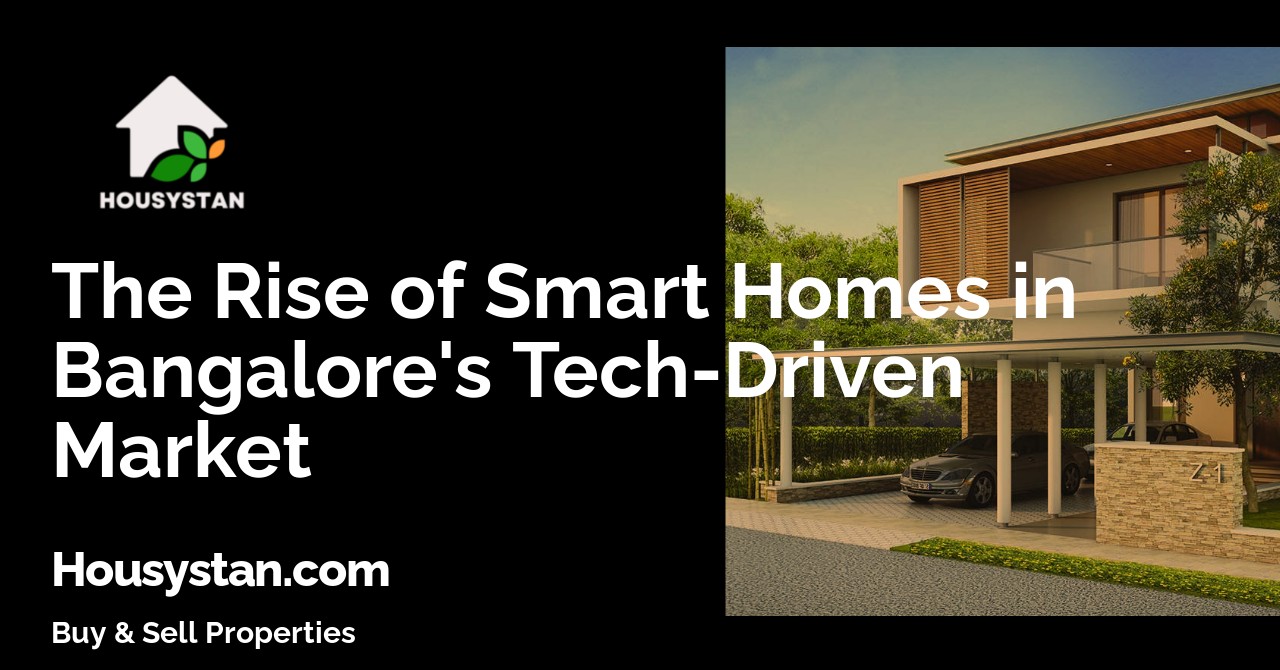The Rise of Smart Homes in Bangalore's Tech-Driven Market
Read latest blogs and articles from Housystan

The Information mentioned here was last updated on:
29/1/2026The Rise of Smart Homes in Bangalore's Tech-Driven Market
As technology evolves at a breakneck pace, the concept of smart homes has emerged as a leading trend, revolutionizing the way we live. This transformation is particularly evident in Bangalore, often referred to as India’s Silicon Valley. Known for its vibrant tech industry, Bangalore is at the forefront of integrating smart home technology, attracting tech enthusiasts and homeowners alike. Let's delve into the world of smart homes, focusing on how this trend is reshaping real estate in Bangalore.
Understanding Smart Homes: What Makes Them "Smart"?
- Verified Tenants/Buyers
- Unlimited Property Listing
- Zero subscription/charges fee
Smart homes incorporate advanced technology to automate and enhance daily living. Key features that define a smart home include:
- Automation: The ability to control various home devices remotely via smartphones or voice commands.
- Connectivity: Integration of home devices through a central hub, allowing for seamless communication and data sharing.
- Energy Efficiency: Smart thermostats, lighting, and appliances that help reduce energy consumption and costs.
- Security: Enhanced home security systems with smart locks, cameras, and alarms that can be monitored from anywhere.
Why Bangalore is a Hub for Smart Home Technology
A Tech-Centric Ecosystem
Bangalore's status as a tech hub contributes significantly to the rise of smart homes. The city's robust startup ecosystem and presence of major tech companies foster an environment ripe for innovation. This dynamic atmosphere supports the development and adoption of new technologies that make homes smarter.
Demand from Tech-Savvy Residents
The population of Bangalore is largely composed of tech-savvy professionals who are early adopters of technology. With strong purchasing power and a keen interest in modern conveniences, these individuals drive the demand for smart homes. This demographic shift is reshaping the landscape of Bangalore real estate, making smart homes increasingly desirable.
Key Components of a Smart Home
Smart Appliances
- Refrigerators: Keep track of food inventory and suggest recipes based on available ingredients.
- Ovens: Allow you to preheat and adjust cooking settings through a smartphone app.
Smart Lighting
- Automated Lighting Systems: Adjust brightness and color based on time of day and presence in the room.
- Voice-activated Controls: Use voice commands to control lights, enhancing convenience and accessibility.
Smart Security Systems
- Surveillance Cameras: Monitor your home in real-time, providing an extra layer of security.
- Smart Locks: Enable keyless entry and allow temporary access privileges for guests or service providers.
Energy Management
- Smart Thermostats: Automatically adjust temperature settings to optimize comfort and energy efficiency.
- Energy Monitoring Tools: Provide insights into energy consumption, helping reduce carbon footprints and utility bills.
Benefits of Adopting Smart Home Technology
Enhanced Convenience and Comfort
Smart homes aim to make life easier by automating mundane tasks. You can control virtually every aspect of your home environment with a few taps on your smartphone or simple voice commands. This level of automation significantly enhances comfort and convenience.
Increased Property Value
In Bangalore's competitive real estate market, smart home features can increase property value and appeal. Homes equipped with the latest technology tend to attract higher offers from potential buyers, making smart homes not just a trend but a smart investment.
Improved Energy Efficiency
With a strong focus on sustainability, smart home technology helps in reducing energy consumption. Smart devices provide actionable insights, allowing homeowners to cut down on unnecessary energy use, which is not only good for the planet but also cost-effective.
Enhanced Safety and Security
Smart security systems provide peace of mind by offering features like remote monitoring, real-time alerts, and automated locks. This heightened level of security is particularly important in urban areas, where homeowners may feel the need for additional safety measures.
Challenges and Considerations
Cost of Installation
One of the primary barriers to adopting smart home technology is the initial cost. High-tech devices and systems can be expensive, making it a sizable investment for homeowners. However, long-term savings on energy bills and increased home value often justify these costs.
Privacy Concerns
With increased connectivity comes the risk of data breaches and privacy concerns. Homeowners must ensure their networks are secure and devices are protected against cyber threats.
Compatibility Issues
Not all smart devices are compatible with each other. Homeowners may face challenges integrating products from different brands. It's vital to research and select compatible devices for a seamless smart home experience.
Embracing the Future: Smart Homes in Bangalore
The rapid adoption of smart home technology in Bangalore reflects a broader trend towards tech-driven living. The city's unique position as a technology leader makes it an ideal ground for experimenting with and refining smart home solutions. As more companies invest in developing these technologies, we can expect continued growth and innovation in this exciting sector.
For homeowners and developers in Bangalore, embracing smart technology not only represents a step towards modernity but also aligns with global trends in energy efficiency, convenience, and enhanced living standards. As this trend gains momentum, the smart home market will undoubtedly see exponential growth, making now a pivotal time for those ready to ride the wave of innovation.
To explore more about smart homes and other real estate trends in Bangalore, consider checking out related articles on innovative home technologies and sustainable living practices. This will keep you up-to-date with the latest advancements and provide insights into making informed decisions in the ever-evolving realm of smart living.